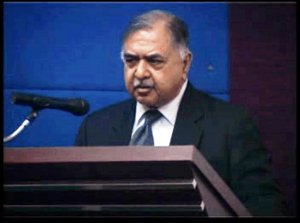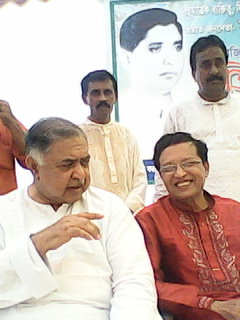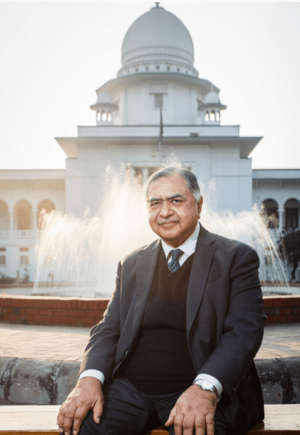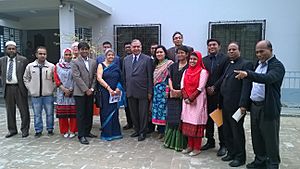Kamal Hossain facts for kids
Quick facts for kids
Kamal Hossain
|
|
|---|---|
|
কামাল হোসেন
|
|
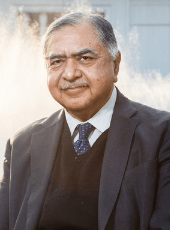
Hossain in March 2013
|
|
| 1st Law Minister of Bangladesh | |
| In office January 1972 – March 1973 |
|
| President | Abu Sayeed Chowdhury |
| Prime Minister | Sheikh Mujibur Rahman |
| Preceded by | Position established |
| Succeeded by | Manoranjan Dhar |
| Parliamentary group | Awami League |
| 3rd Foreign Minister of Bangladesh | |
| In office March 1973 – August 1975 |
|
| President | Abu Sayeed Chowdhury Mohammad Mohammadullah Sheikh Mujibur Rahman |
| Prime Minister | Sheikh Mujibur Rahman |
| Preceded by | Abdus Samad Azad |
| Succeeded by | Abu Sayeed Chowdhury |
| 2nd Petroleum Minister of Bangladesh | |
| In office 1974–1975 |
|
| President | Mohammad Mohammadullah Sheikh Mujibur Rahman |
| Prime Minister | Sheikh Mujibur Rahman |
| Preceded by | Mofiz Chowdhury |
| Personal details | |
| Born | 20 April 1937 Calcutta, Bengal, British India |
| Nationality | Bangladeshi |
| Political party | Gano Forum Awami League |
| Spouse |
Hameeda Hossain
(m. 1963) |
| Children | Sara Hossain, Dina Hossain |
| Alma mater |
|
| Occupation | Lawyer, politician and academic |
| Known for | One of the key authors of the Constitution of Bangladesh |
Kamal Hossain (born 20 April 1937), often called Dr. Kamal, is a very important lawyer and politician from Bangladesh. He helped found the country. Many people call him the "Father of the Bangladeshi Constitution" because he played a key role in writing it. He is also seen as a symbol of fair and equal democracy in the Indian subcontinent.
Dr. Kamal runs his own law firm in Dhaka. He stopped his political activities and stepped down as president of the Gano Forum party in October 2023.
Hossain studied in the United States at the University of Notre Dame and in the United Kingdom at the University of Oxford. He became a lawyer in England and Wales in 1959. He then worked as a lawyer in the High Court of East Pakistan. Early in his career, he worked with famous lawyers like former Prime Minister Huseyn Shaheed Suhrawardy. Hossain often helped people who went missing during the rule of military leader Ayub Khan.
From 1961 to 1968, he taught law at Dhaka University. Hossain was the lawyer for the Awami League party and its leader Sheikh Mujibur Rahman during the Agartala Conspiracy Case. He was elected vice-chairman of the Pakistan Bar Council in 1970, before Pakistan split. In 1971, he was part of the Awami League's team that talked about how power would be transferred after the 1970 Pakistani general election. Hossain was put in prison in West Pakistan with Sheikh Mujibur Rahman during the war of independence. This war turned East Pakistan into Bangladesh.
After Bangladesh became independent, Hossain served in its first government from 1972 to 1975. He was the Law Minister and led the committee that wrote the Constitution. Under his leadership, Bangladesh became the first country in South Asia to be a secular state by its constitution. He then became the Foreign Minister and helped Bangladesh join the United Nations in 1974. As Energy Minister, Hossain later created the Bangladesh Petroleum Act. Some of his legal changes were even used as examples in India and China.
Hossain was visiting Yugoslavia when Sheikh Mujibur Rahman was killed in 1975. He survived the event and later worked at Oxford University. In 1981, he ran for president against Abdus Sattar. In the 1990s, Hossain disagreed with Awami League president Sheikh Hasina and started his own party, the Gano Forum (People's Forum). Hossain has often worked with the United Nations and the Commonwealth of Nations. He was even considered for the job of UN Secretary General.
Journalist Mizanur Rahman Khan called Hossain the "conscience of the nation." The New York Times compared him to Adlai Stevenson II in 1981. Hossain has been a leading lawyer in human rights, energy law, and international legal disputes. He worked for the Iran-United States Claims Tribunal and as a UN Special Rapporteur for Afghanistan. Hossain has also been part of groups that settled sea disputes between countries like Malaysia and Singapore, and Guyana and Suriname.
Contents
Early Life and Education
Hossain's family comes from one of the important land-owning families of Shayestabad in Barisal. His family believes they are related to Ali, an important leader in Islam. His grandfather, Syed Sadat Hossain, was related to the Nawab of Shayestabad. Hossain's father, Ahmed Hossain, was one of the first Bengali Muslim doctors in Calcutta, Bengal Presidency, British India. He was also related to Huseyn Shaheed Suhrawardy, who was a Prime Minister of Bengal and later Pakistan.
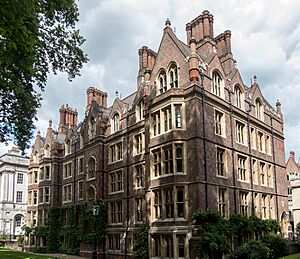
Kamal Hossain was born on 20 April 1937 in Calcutta. His family moved to Dhaka, East Bengal in 1949 after India was divided. Hossain went to St. Gregory's High School. When he was 16, he received a scholarship to the University of Notre Dame in the US. He earned a bachelor's degree in economics there and later studied for a master's degree at the University of Michigan.
He was inspired by Justice Fazal Akbar to study law. In 1958, Hossain moved from the US to England. In 1959, he earned a law degree from the University of Oxford and became a barrister (a type of lawyer) at Lincoln's Inn. He also became a lawyer in the High Court of East Pakistan. In 1964, Hossain earned a PhD in international law from Oxford. His PhD paper was about "State Sovereignty and the United Nations Charter."
Early Legal Career in East Pakistan
Hossain started his law practice at Orr, Dignam and Co., one of the last British law firms in the area. He joined their Dhaka office in 1959. There, he often worked with barrister and former prime minister Huseyn Shaheed Suhrawardy. Pakistan was under military rule after a coup in 1958. Hossain said that he and Suhrawardy would drive in a zigzag way to avoid Pakistani intelligence cars. Through Suhrawardy, Hossain met Sheikh Mujibur Rahman.
Hossain defended Maulana Bhashani in a case about missing persons. He also represented The Daily Ittefaq, a large Bengali newspaper in East Pakistan, when the government tried to ban it. The court ruled in favor of Hossain and his team.
He started teaching part-time at Dhaka University in 1961, teaching international law. He continued teaching until 1969 and strongly supported the six point movement, which called for more power for East Pakistan.
During the Agartala Conspiracy Case, Hossain helped prepare the legal documents. From 1967 to 1969, he was elected vice-chairman of the East Pakistan Bar Council. In 1969, he was elected the last vice-chairman of the All-Pakistan Bar Council. In 1969 and 1970, he was involved in important talks between the Pakistani government and major opposition parties, led by the Awami League.
Kamal Hossain was the Awami League's main negotiator. After the 1970 Pakistani general election, Sheikh Mujib allowed Hossain to be elected to the National Assembly of Pakistan. Hossain was seen as one of Mujib's closest advisors. Between January and March 1971, Hossain talked with Pakistan's Law Minister and other lawyers about transferring power.
Role in Independent Bangladesh
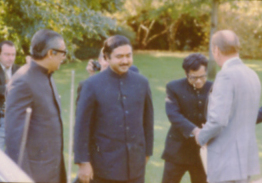
Hossain was imprisoned in West Pakistan during the 1971 Bangladesh War of Independence. He was released on 28 December 1971. After his release, he traveled with Sheikh Mujibur Rahman to London and New Delhi, before returning to an independent Bangladesh on 10 January 1972.
Hossain became the first law minister of the new country. One of his main jobs was to create a constitution. He led the committee that wrote the Constitution of Bangladesh. He was only 35 years old, making him one of the youngest people to help write a country's constitution. The Constitution of Bangladesh was approved on 4 November 1972 and became law on 16 December 1972. It included a list of rights and set up a parliamentary government.
The constitution also mentioned socialism, aiming for a "socialist society" through democracy. Hossain explained that this meant a democratic form of socialism, not communism. He said socialism was a big idea in South Asia during the 1960s and 1970s. For example, the Constitution of India also mentions socialism.
Hossain served as a Member of Parliament from Dhaka. He became the Foreign Minister of Bangladesh in 1973. Hossain helped Bangladesh join the United Nations in 1974. The U.S. Secretary of State Henry Kissinger even called Hossain "another student of mine."
Hossain signed the Delhi Agreement between India, Pakistan, and Bangladesh. This agreement aimed to make relations normal again in the region after the 1971 conflict. In the agreement, Pakistan promised to release Bengali families who were held there. In return, India and Bangladesh would send back prisoners of war. Hossain said he had good relations with Indian Prime Minister Indira Gandhi and her foreign minister.
Hossain was also appointed as energy minister. After the 1973 oil crisis, developing countries like Bangladesh needed to find their own oil and gas. There was a chance of large reserves in the Bay of Bengal. Hossain studied the laws needed for Bangladesh to start its own oil and gas industry. Many foreign companies wanted to explore the bay. Under Hossain, Petrobangla was created. Hossain wrote the Bangladesh Petroleum Act after studying laws from Malaysia and Indonesia. This new law replaced older laws and allowed international companies to share oil production with Bangladesh.
Hossain offered to resign several times due to political pressure. However, he continued to serve in Mujib's government, even after the BAKSAL one-party system was created in 1975. He was visiting Yugoslavia when Sheikh Mujibur Rahman was killed on 15 August 1975. He refused to join the new military government. Fearing for his safety, he moved to Oxford University to teach and do research.
Hossain later said he didn't fully understand why Mujib changed the system to BAKSAL. The next government was a military government for three years. In 1979, President Ziaur Rahman brought back multi-party politics and free markets. Hossain returned to Bangladesh during this time.
In 1981, Hossain helped Sheikh Hasina return to Bangladesh from her exile in India. He ran for president in the 1981 Bangladeshi presidential election as the Awami League's candidate. He lost to Justice Abdus Sattar. In 1990, when President Hussain Muhammad Ershad was overthrown, Hossain played a key role in planning how to bring back parliamentary democracy.
In 1992, Hossain left the Awami League due to disagreements with Sheikh Hasina. He started a new political party called Gano Forum. In 1996, when the Awami League and Bangladesh Nationalist Party (BNP) were having major disagreements, Kamal Hossain helped create the system of caretaker governments for holding general elections. This system was later used in other countries like Pakistan.
In 2003, Hossain was the lawyer for the editors of The Daily Star and Prothom Alo in a defamation case. In 2006, he led the legal fight against a fake voter list made by the government. Hossain also spoke out against extrajudicial killings by the Rapid Action Battalion.
Hossain has criticized human rights abuses under later governments. In 2011, he defended Nobel laureate Muhammad Yunus in court. In 2018, Hossain defended photographer Shahidul Alam after he was arrested for criticizing the Prime Minister. Hossain also supported former chief justice Surendra Kumar Sinha.
In October 2018, Kamal Hossain announced a new political group called Jatiya Oikya Front (National Unity Front), which was supported by the BNP. Hossain spoke at political rallies across Bangladesh. He warned the government of legal consequences if the opposition's election demands were not met. At a rally in Dhaka, Hossain said, "The state does not belong to any king or queen. It is the people who are the sole owners of the state."
He helped start talks between Prime Minister Sheikh Hasina and the BNP. The US Ambassador to Bangladesh praised these talks. The talks happened in November 2018.
The 2018 Bangladeshi general election was held with many claims of vote rigging and intimidation. Hossain said, "There was an unprecedented vote robbery, which is a mockery of democracy." He called for the Election Commission to cancel the election and hold a new one. After the commission refused, Hossain called the new government "illegitimate." He said, "We need a united movement of citizens, political parties and human rights organizations."
The United States and the European Union (EU) also expressed concerns about the election's fairness. The EU said they expected Bangladesh to move towards democracy and respect human rights. The US State Department encouraged all parties to avoid violence and asked the Election Commission to address claims of problems.
Important Legal Work
From 1977 to 2001, Hossain worked as an international advisor for the law firm Clifford Chance. He was also President of the Supreme Court Bar Association from 1990 to 1991.
Scimitar v Bangladesh
Kamal Hossain and Justice Badrul Haider Chowdhury led the Bangladeshi legal team in a lawsuit filed by Scimitar Exploration Ltd. This case was heard at the International Centre for Settlement of Investment Disputes (ICSID).
Chevron v Bangladesh
Kamal Hossain represented Petrobangla in a lawsuit filed by Chevron at the ICSID. The court rejected Chevron's claims for a large sum of money from Petrobangla.
International Roles
Hossain is known worldwide as a legal expert and has worked with the United Nations for a long time. From 1998 to 2003, he was the UN Special Rapporteur for Afghanistan. He also served two terms on the UN Compensation Commission in Geneva. He has been involved in many international legal disputes, both as a lawyer and as a judge. He was a member of the Iran-United States Claims Tribunal. In 2001, he co-chaired a UN commission looking into human rights problems. He also chaired an advisory commission on human rights for the Commonwealth Secretariat.
At the request of the UN, Hossain advised China on legal changes related to energy when China started to open up its economy.
He is a member of the Panel of Arbitrators at ICSID and has led or been a member of several international legal panels. He was appointed as a special judge for Malaysia in a case against Singapore in 2003. He was also part of a tribunal for a case between Guyana and Suriname from 2005 to 2007.
He has also been vice chairman of the International Law Association in London. He is chairman of the South Asian Institute of Advanced Legal and Human Rights Studies (SAILS) and an advisor for Transparency International. He has also observed international elections.
At the request of the Commonwealth Secretary-General, Hossain visited Cameroon and The Gambia to check on democracy and human rights there. He was also part of the Commonwealth observer team during the 1994 South African general election. Hossain has advised the governments of several other countries, including Trinidad and Tobago and Fiji.
Public View
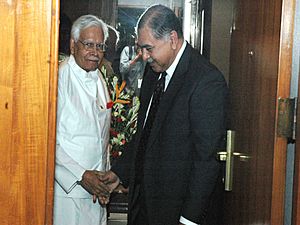
Hossain is seen as a leader of liberal and secular politics in modern Bangladesh. He has been called the "elder statesman" of Bangladesh and the "conscience of the nation." An article in The Daily Star said that he has become an "effective moral voice for the country." In 1981, The New York Times compared Hossain to the former US senator Adlai Stevenson, who was known for being very smart. In 2018, The Diplomat magazine called Hossain a "shrewd" (clever) behind-the-scenes player.
In neighboring India and Pakistan, Hossain is respected as a secular leader. In 2012, he gave a speech in Pakistan about "Building a peaceful South Asia."
Political Criticism
During the 2018 election, some people criticized Kamal Hossain. Shah Ali Farhad wrote that Hossain was "not so conscientious" and that his party, Gono Forum, had no new leaders coming up.
Arun Kumar Goswami, a professor, said that Hossain's style of politics might not work in Bangladesh because he doesn't have a strong connection with many ordinary people. However, Moudud Ahmed disagreed, saying other politicians have succeeded with less public contact.
When Hossain asked for a caretaker government in 2018, Sheikh Hasina pointed out that the first constitution, which Hossain helped write, didn't include such a rule. The BNP responded by saying that Hasina herself had pushed for caretaker governments in 1996.
In 2017, Hossain used a strong word towards the Attorney General in court and was corrected by the chief justice.
During the 2018 election campaign, Hossain was asked about the relationship between the BNP and Jamaat. He told the reporter to "keep quiet" but later said he regretted his reaction. He later called the BNP-Jamaat relationship "stupid."
Writings
Hossain published a book about petroleum law in 1979 called Law and policy in petroleum development: Changing relations between transnationals and governments. In 2013, Oxford University Press published his memoir, Bangladesh: Quest for Freedom and Justice. Hossain also wrote a book in Bengali in 1994, called Svāẏattaśāsana theke svādhīnatā (Civil government and independence).
Academic Work
Hossain taught constitutional law and international law at Queen's College, Oxford from 1957 to 1959. He was also a research student and fellow at Nuffield College, Oxford, and a visiting fellow at All Souls College, Oxford. He taught international law and constitutional law at the University of Dhaka from 1962 to 1967. In 1997, he was a visiting professor at the Free University of Amsterdam.
Personal Life
Hossain married Hameeda Hossain in 1963. They have two daughters: Sara Hossain, who is a leading civil rights lawyer in Bangladesh, and Dina Hossain, who is a filmmaker. His son-in-law (Sara Hossain's husband) is British journalist David Bergman.
 | Percy Lavon Julian |
 | Katherine Johnson |
 | George Washington Carver |
 | Annie Easley |


